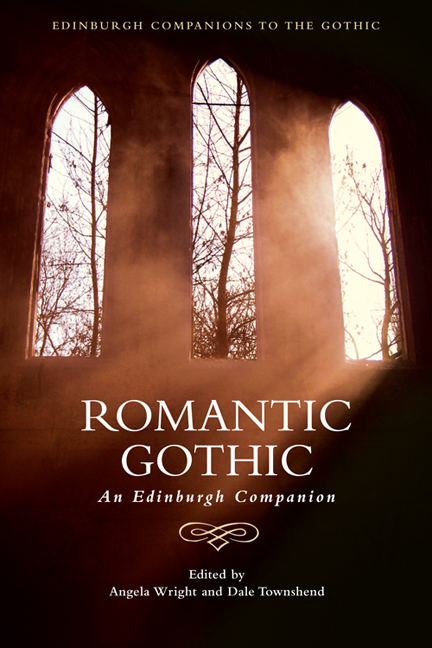Book contents
- Frontmatter
- Contents
- 1 Gothic and Romantic: An Historical Overview
- Part I Gothic Modes and Forms
- 2 Graveyard Writing and the Rise of the Gothic
- 3 Gothic Romance
- 4 The Gothic Stage: Visions of Instability, Performances of Anxiety
- 5 Gothic Poetry and First-Generation Romanticism
- 6 Gothic and Second-Generation Romanticism: Lord Byron, P. B. Shelley, John Polidori and Mary Shelley
- 7 Political Gothic Fiction
- 8 Shorter Gothic Fictions: Ballads and Chapbooks, Tales and Fragments
- 9 Oriental Gothic
- 10 Gothic Parody
- Part II National and International Borders
- Part III Reading the Romantic Gothic
- Notes on Contributors
- Index
8 - Shorter Gothic Fictions: Ballads and Chapbooks, Tales and Fragments
from Part I - Gothic Modes and Forms
Published online by Cambridge University Press: 05 August 2016
- Frontmatter
- Contents
- 1 Gothic and Romantic: An Historical Overview
- Part I Gothic Modes and Forms
- 2 Graveyard Writing and the Rise of the Gothic
- 3 Gothic Romance
- 4 The Gothic Stage: Visions of Instability, Performances of Anxiety
- 5 Gothic Poetry and First-Generation Romanticism
- 6 Gothic and Second-Generation Romanticism: Lord Byron, P. B. Shelley, John Polidori and Mary Shelley
- 7 Political Gothic Fiction
- 8 Shorter Gothic Fictions: Ballads and Chapbooks, Tales and Fragments
- 9 Oriental Gothic
- 10 Gothic Parody
- Part II National and International Borders
- Part III Reading the Romantic Gothic
- Notes on Contributors
- Index
Summary
The publication history of the little-known Gothic story ‘Albert of Werdendorff; or, The Midnight Embrace. A Romance from the German’ (1812) provides a case study of the obscurities and complexities attending an investigation of shorter Gothic tales during the early nineteenth century. If this tale is known at all today, one would credit Franz Potter's 2004 edition of the chapbook by Sarah Wilkinson. In his introduction to the tale, Potter reasonably argues that this tale of seduction, betrayal and revenance draws upon M. G. Lewis's then famed ‘Alonzo the Brave and Fair Imogene’, first appearing in The Monk (1796), later in many literary magazines, and then in Lewis's ‘hobgoblin repast’, Tales of Wonder (1801), a collection of Gothic ballads and burlesques. However, the real source of Wilkinson's tale is the anonymous ballad ‘Albert of Werdendorff; or, The Midnight Embrace. A German Romance’ from Tales of Terror (1801), another anonymous collection of Gothic tales and burlesques many times wrongly attributed to Lewis. Wilkinson simply drew upon, without acknowledging, the ballad of the tale in creating her prose version and, as was her wont, she ‘extracts’ a ‘moral’ from the original: ‘virtue is a female's firmest protector’ (Wilkinson 2004: 29). The story of Albert does not end there: as something of a revenant itself, the tale reappears as ‘The Midnight Embrace in the Halls of Werdendorff’ in Legends of Terror! and Tales of the Wonderful and the Wild. Original and Select, In Prose and Verse (1826), a 642-page compendium of Gothic ballads and prose short stories that casts its net widely in gathering Gothic tales from a variety of sources (ballads, magazines, annuals, previous collections and chapbooks). Although very few of the ‘Legends’ are attributed to authors – indeed, the overall volume contains no indication of the names of its editors – this reincarnation of ‘Albert’ does provide both ‘Prose and Verse’, as it begins with a selection from the 1801 ballad and then reprints Wilkinson's chapbook sans her concluding ‘moral’.
This curious, but not atypical, little bibliographic tale suggests a number of things about the subject of shorter Gothic fiction in the first quarter of the nineteenth century.
- Type
- Chapter
- Information
- Romantic GothicAn Edinburgh Companion, pp. 147 - 166Publisher: Edinburgh University PressPrint publication year: 2015



